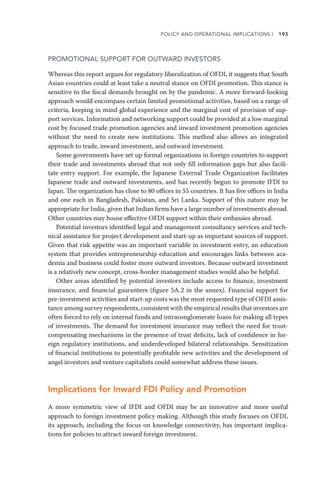POLICY AND OPERATIONAL IMPLICATIONS l 193
PROMOTIONAL SUPPORT FOR OUTWARD INVESTORS Whereas this report argues for regulatory liberalization of OFDI, it suggests that South Asian countries could at least take a neutral stance on OFDI promotion. This stance is sensitive to the fiscal demands brought on by the pandemic. A more forward-looking approach would encompass certain limited promotional activities, based on a range of criteria, keeping in mind global experience and the marginal cost of provision of support services. Information and networking support could be provided at a low marginal cost by focused trade promotion agencies and inward investment promotion agencies without the need to create new institutions. This method also allows an integrated approach to trade, inward investment, and outward investment. Some governments have set up formal organizations in foreign countries to support their trade and investments abroad that not only fill information gaps but also facilitate entry support. For example, the Japanese External Trade Organization facilitates Japanese trade and outward investments, and has recently begun to promote IFDI to Japan. The organization has close to 80 offices in 55 countries. It has five offices in India and one each in Bangladesh, Pakistan, and Sri Lanka. Support of this nature may be appropriate for India, given that Indian firms have a large number of investments abroad. Other countries may house effective OFDI support within their embassies abroad. Potential investors identified legal and management consultancy services and technical assistance for project development and start-up as important sources of support. Given that risk appetite was an important variable in investment entry, an education system that provides entrepreneurship education and encourages links between academia and business could foster more outward investors. Because outward investment is a relatively new concept, cross-border management studies would also be helpful. Other areas identified by potential investors include access to finance, investment insurance, and financial guarantees (figure 5A.2 in the annex). Financial support for pre-investment activities and start-up costs was the most requested type of OFDI assistance among survey respondents, consistent with the empirical results that investors are often forced to rely on internal funds and intraconglomerate loans for making all types of investments. The demand for investment insurance may reflect the need for trustcompensating mechanisms in the presence of trust deficits, lack of confidence in foreign regulatory institutions, and underdeveloped bilateral relationships. Sensitization of financial institutions to potentially profitable new activities and the development of angel investors and venture capitalists could somewhat address these issues.
Implications for Inward FDI Policy and Promotion A more symmetric view of IFDI and OFDI may be an innovative and more useful approach to foreign investment policy making. Although this study focuses on OFDI, its approach, including the focus on knowledge connectivity, has important implications for policies to attract inward foreign investment.

